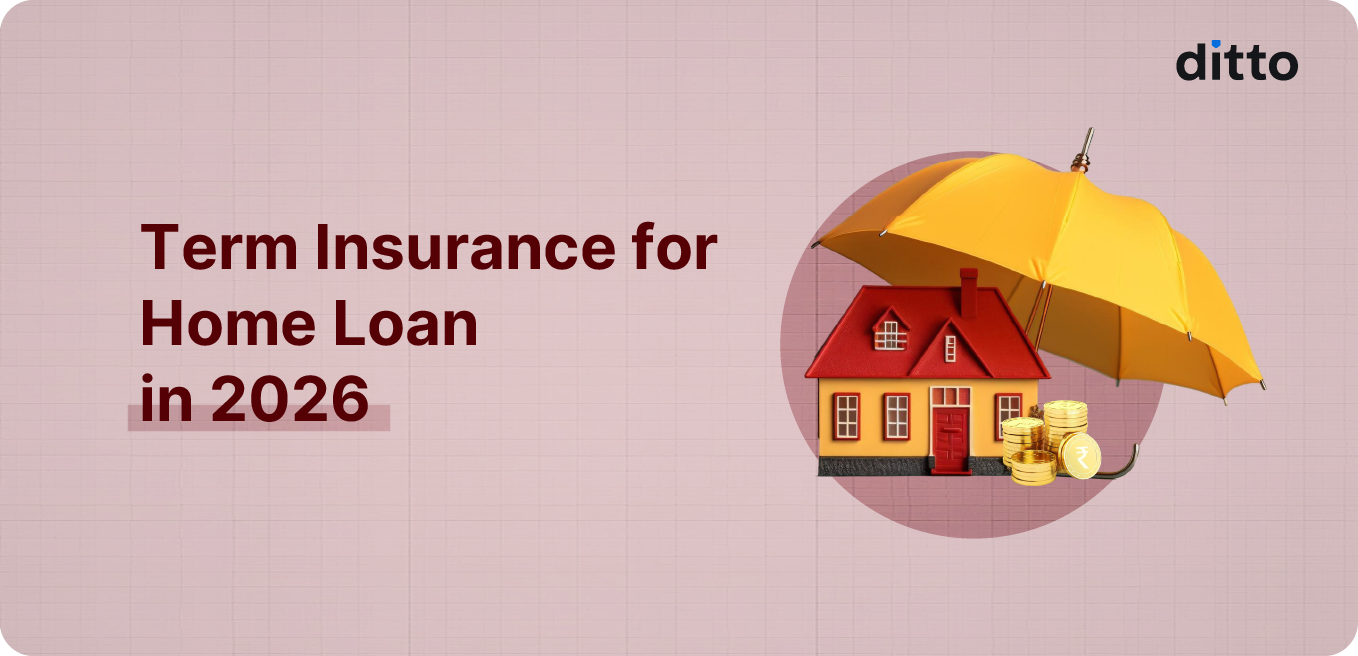Quick Overview
Once the excitement of buying a new home with the help of a loan subsides, you can’t help but worry about EMIs. One probing question is what would happen to your home and its EMIs if something were to happen to you? This is where term insurance tied to your home loan can provide much-needed security.
In this article, we explore why term insurance for home loans matters, what it offers, and how it compares with loan-linked home-loan insurance or protector plans.
Difference Between Home Loan Insurance and Home Loan
A home loan is simply the amount you borrow from a lender to finance the purchase of your property. Home loan insurance, on the other hand, is a policy that covers the outstanding loan balance if the borrower passes away.
However, home loan insurance isn’t always the most suitable or cost-effective choice, especially if you already have sufficient term insurance that can serve the same purpose. You can assign your personal term plan to the lender. In the event of your demise, the lender has priority to recover the outstanding loan amount, and any remaining proceeds are then paid to your nominees.
How Does Term Insurance for Home Loans Work?
- You select a sum assured (the amount of coverage you want), which should be enough to cover outstanding loans, future financial needs, family expenses, and other expenses. If you need help, you can use our term insurance coverage calculator or book a free consultation call.
- You pay regular premiums (monthly, yearly, or as per policy terms).
- Suppose you pass away during the policy term. In that case, the policy pays a lump sum (or staggered benefits, depending on the plan) to the beneficiaries.
Tax Benefits of Home Loan and Term Insurance
Combining a home loan and a term insurance policy can provide significant tax benefits.
- Under Section 80C (Old regime) of the Income Tax Act, you can claim a deduction (up to ₹1.5 lakh per financial year) on the premiums paid for term insurance + principal repayment of the home loan.
- Under Section 24(b), interest paid on self-occupied home loans is deductible (up to ₹2 lakh annual limit).
- For first-time homebuyers (with property whose stamp value doesn’t exceed ₹45 lakhs), there may be additional interest deduction under Section 80EEA, making home-loan + term insurance more tax-efficient.
Together, these deductions reduce taxable income and ease the financial burden of both loan repayment and insurance premiums.

Insurance Types That Protect Your Home Loan
Regular Personal Term Insurance Plan
You buy a regular term plan with sufficient cover (say ₹1-2 crore), where you own the policy, and your family is the nominee.
Bank’s Home Loan Protection Plan (HLPP)
This is also called mortgage-reducing term insurance. Here, your sum assured will be roughly equal to the loan amount, and the cover reduces each year as you pay EMIs. The bank is usually the assignee/primary beneficiary, and it gets the money first to settle the loan.
Bank’s Group Credit Life / Group Home Loan Cover
Bank/NBFC has a group insurance tie-up with an insurer. Here, all borrowers are added as members to this “master policy”.
Note: You get a certificate of insurance, not a full, standalone policy.
Although this has simpler onboarding and less strict medicals, the premiums can still be higher than a good retail term plan for the same cover period.
Premiums and Cost Structures in Insurance
Why Choose Ditto for Term Insurance?
At Ditto, we’ve assisted over 8,00,000 customers with choosing the right insurance policy. Why customers like Aaron below love us:

- No-Spam & No Salesmen
- Rated 4.9/5 on Google Reviews by 15,000+ happy customers
- Backed by Zerodha
- 100% Free Consultation
You can book a FREE consultation. Slots are running out, so make sure you book a call now!
Conclusion
Term insurance for a home loan is one of the simplest and most effective ways to protect your family from inheriting debt and financial stress. Unlike bank-offered home loan insurance, a standalone term insurance plan gives you better flexibility, more exhaustive coverage, and long-term value.
By choosing the correct sum assured and aligning it with your loan and your family’s needs, you can secure both your home and your loved ones’ future with confidence.
Frequently Asked Questions
Last updated on:










